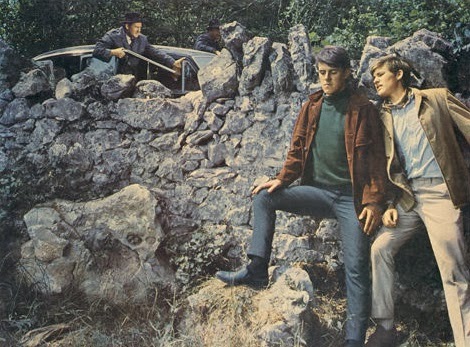Top o' the morning film fans! Silver Scenes is proud to present The Luck of the Irish Blog o'thon...a wee little event to celebrate the joy and talent that the Irish have brought to the silver screen for many many years.
You need not be Irish to participate in this ceilidh because on holy St. Patrick's Day we all be wearing a touch o' the green.....
THE DETAILS: We not be specific - you can write about almost anything so long as it has a bit o' Irish in it, was filmed prior to 1975, and features no blessed word spoken against the little people. Will you be wanting to write about an Irish-made production? That'll be grand! Will ye be caring to write about an Irish-born actor? We tip our hats to ye!
Movies that take place in Ireland are surely welcome and you most certainly can write about an American actor with an Irish heritage. We not be turning down any post on Cagney himself. And do not be forgetting the talented Irish men and women who worked behind the magic movie screen as well.
If ye need some inspiration to get your heart a beatin', here be some suggestions :
Films: The Quiet Man, Return to Glennascaul, Captain Boycott, The Informer, Darby O'Gill and the Little People, Parnell, The Molly McGuires, Finian's Rainbow, Little Nellie Kelly, The Girl with Green Eyes, Odd Man Out, The Plough and the Stars, The Shame of Mary Boyle, Top O' the Morning, Gentlemen Jim, I See a Dark Stranger, Irish and Proud of It, Guns in the Heather, Barry Lyndon, Young Cassidy, The Fighting Prince of Donegal, Going My Way, This Other Eden, Shake Hands with the Devil, The Long Gray Line, The Sporting Irish, Peg O' My Heart, The Hills of Ireland, Wings of the Morning, Man of Aran, Mother Machree, The Rose of Kildare, My Wild Irish Rose, Daughter of Rosie O'Grady, Yankee Doodle Dandy, Leave it to the Irish, Gateway, The Story of Seabiscuit, Sally and Saint Anne, The Fighting O'Flynn.
__________________________________________________________
Personalities: John Ford, George Murphy, James Cagney, Peter O'Toole, Richard Harris, Maureen O'Hara, John Ford, Barry Fitzgerald, Bing Crosby ( what the hey! ), Dennis Morgan, Stephen Boyd, Arthur Shields, Pat O'Brien, Richard Todd, George Brent, Owen Moore, Charles B. Fitzsimmons, Roy William Neill, James Kilgannon, Sara Allgood, Rex Ingram, Patrick Delany, Una O'Connor, David S. Hall, Brian Donlevy, Niall MacGinnis, Rod Taylor, Alan Young.
__________________________________________________________
DATE: The Luck of the Irish Blog o'thon runs from March 15th through St. Paddy's Day itself. Ready to join in the jig? Just drop your name, blog site, and the topic you be wanting to write about in the comment box below.
DEADLINE : Entries will be accepted up until midnight on the 17th of March. If you denno get your entry in by that time, you'll be hearing the wailin' o' the banshee at your backdoor wondering why ye had forgotten her!
'Tis no good hosting a blogathon without a followin' of fans to participate in it, so we be asking kindly that you post these pretty little Irish banners on those pretty little blogs of your own...with a link back if ye may :












